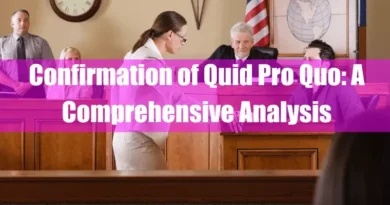Can Physician Call Groups Have a Quid Pro Quo Agreement?
Physician call groups can potentially have quid pro quo agreements. Still, such arrangements must be carefully structured to comply with legal and ethical standards. Quid pro quo agreements in this context refer to situations where physicians exchange on-call duties or other professional services for mutual benefit.
However, these agreements must avoid any form of kickback or improper incentive that could violate laws such as the Anti-Kickback Statute or the Stark Law, prohibiting financial arrangements that could influence referrals for services covered by federal healthcare programs. Physician call groups must ensure transparency and maintain proper documentation of their agreements. They seek legal counsel to navigate complex regulations and avoid any semblance of impropriety or conflicts of interest.
Takeaways
| Key Points |
|---|
| Quid pro quo agreements in physician call groups involve reciprocal exchanges of services, such as trading on-call duties, which can enhance service delivery and workload management, but these arrangements require strict adherence to legal and ethical standards. |
| Key legal frameworks include the Anti-Kickback Statute, which prohibits financial inducements for referrals in federally funded programs, and the Stark Law, which restricts self-referrals unless exceptions apply, with violations leading to severe penalties. |
| Ethical guidelines from organizations like the AMA emphasize prioritizing patient welfare, avoiding conflicts of interest, and maintaining professionalism in these agreements. |
| Practical applications include on-call duty exchanges, which are permissible when transparently documented and compliant, while referral agreements face stricter scrutiny due to regulatory risks. |
| To mitigate risks, physician call groups should document agreements thoroughly, consult legal counsel, provide compliance training, conduct audits, and apply relevant exceptions to maintain integrity and avoid enforcement actions. |
Introduction
In the medical community, particularly among physician call groups, quid pro quo agreements can be a topic of significant interest and concern. These arrangements, where one service or favor is exchanged for another, can help manage workloads and enhance service delivery. However, the legality and ethical implications of such agreements need careful consideration. This article explores whether physician call groups can have quid pro quo agreements, examining the legal frameworks, ethical standards, and practical considerations involved.

Understanding Quid Pro Quo Agreements
A quid pro quo agreement is a reciprocal arrangement where one party provides a service or favor in exchange for something of value from another party. This might involve trading on-call duties, patient referrals, or other professional services in physician call groups. While such agreements can be mutually beneficial, they must adhere to stringent legal and ethical standards to avoid conflicts of interest or violations of healthcare regulations.
Legal Framework Governing Quid Pro Quo in Healthcare
Physicians and healthcare organizations operate under complex laws to prevent fraud and abuse, particularly in federal healthcare programs. Key among these are the Anti-Kickback Statute and the Stark Law.
Anti-Kickback Statute: This federal law prohibits offering, paying, soliciting, or receiving anything of value to induce or reward referrals for services covered by federally funded programs like Medicare or Medicaid. Violations can lead to severe penalties, including fines, exclusion from federal healthcare programs, and even imprisonment.
Stark Law: Also known as the physician self-referral law, it prohibits physicians from referring patients for designated health services payable by Medicare or Medicaid to entities with which they have a financial relationship unless an exception applies. This law aims to prevent financial incentives from influencing medical decision-making.

Ethical Considerations
Beyond legal requirements, quid pro quo agreements among physician call groups must also adhere to ethical standards. The American Medical Association (AMA) guides physicians in maintaining professionalism and avoiding conflicts of interest. Physicians are urged to prioritize patient welfare over personal or financial gain and disclose any potential conflicts to patients and colleagues.
Practical Applications and Limitations
While legal and ethical frameworks provide clear boundaries, the practical application of quid pro quo agreements in physician call groups can vary.
On-Call Duty Exchanges: One common quid pro quo in medical practice is the exchange of on-call duties. Physicians may agree to cover each other’s shifts, allowing for a more balanced workload. These arrangements can be legally permissible as long as they are transparently documented and do not involve any remuneration beyond the agreed exchange of services.
Referral Arrangements: Patient referrals are another potential area for quid pro quo agreements. However, these arrangements are highly regulated due to the risk of violating the Anti-Kickback Statute or the Stark Law. Any referral agreement must be structured to avoid suggesting improper financial gain or inducement.
Documentation and Transparency

Physician call groups should thoroughly document quid pro quo agreements to mitigate legal and ethical risks. Clear records demonstrate transparency and compliance with regulatory standards. Legal counsel should review these agreements to ensure they adhere to applicable laws and ethical guidelines.
Case Studies
Examining case studies where quid pro quo agreements have been scrutinized can provide valuable insights. For instance, past enforcement actions by the Office of Inspector General (OIG) highlight the importance of compliance. In one notable case, a healthcare provider faced significant penalties for engaging in kickback arrangements disguised as legitimate business transactions. Such examples underscore the need for cautious and compliant structuring of reciprocal agreements.

Strategies for Compliance
Physician call groups considering quid pro quo agreements should implement robust compliance strategies:
- Legal Review: Engage healthcare attorneys to review proposed agreements for compliance with the Anti-Kickback Statute, Stark Law, and other relevant regulations.
- Education and Training: Provide ongoing training for physicians and staff on legal and ethical standards related to quid pro quo agreements.
- Internal Audits: Conduct regular audits to ensure adherence to compliance programs and identify potential risks.
Conclusion
Physician call groups can potentially have quid pro quo agreements, but these must be carefully structured to comply with legal and ethical standards. Such contracts should prioritize transparency, documentation, and patient welfare, ensuring they do not violate the Anti-Kickback Statute, the Stark Law, or moral guidelines set forth by professional organizations like the AMA. By following these principles, physician call groups can effectively manage workloads and enhance service delivery while maintaining compliance and integrity.
FAQ
Can physician-call groups enter into financial agreements that are not considered quid pro quo?
Yes, physician call groups can enter into financial agreements that are not considered quid pro quo as long as these agreements comply with legal and ethical standards. Such arrangements might include straightforward compensation for services provided, structured under fair market value, and documented appropriately to avoid any appearance of impropriety or inducement.
How can physician call groups ensure their agreements comply with the Anti-Kickback Statute?
Physician call groups should consult healthcare legal professionals when drafting agreements to ensure compliance with the Anti-Kickback Statute. They should focus on transparent, documented arrangements that do not offer, solicit, or receive anything of value in exchange for patient referrals or other services covered by federal healthcare programs.
What are the potential consequences for physician call groups that violate the Stark Law?
Violations of the Stark Law can result in severe consequences, including substantial financial penalties, exclusion from federal healthcare programs, and damage to professional reputations. Physician call groups must seek legal counsel to ensure their agreements do not involve prohibited self-referrals and comply with all exceptions outlined in the law.
Are there any exceptions to the Stark Law that allow specific quid pro quo arrangements?
Yes, the Stark Law includes several exceptions for certain financial relationships and quid pro quo arrangements. These exceptions include but are not limited to, in-office ancillary services, physician services, and certain rental or lease agreements. Physician call groups should consult legal experts to understand and apply these exceptions correctly.
What is a physician call group?
A physician call group is an organized team of doctors who share on-call responsibilities to provide continuous patient care, particularly during off-hours. These groups help distribute workload, ensure adequate coverage, and maintain consistent quality of care among participating physicians.
What is a quid pro quo agreement in this context?
In the context of physician call groups, a quid pro quo agreement is an arrangement where each member commits to provide on-call services in exchange for reciprocal benefits, such as shared compensation or time-off credits. This transactional relationship is structured to ensure fair participation and a balanced workload among physicians.
How does reciprocal on-call coverage factor into these agreements?
Reciprocal on-call coverage means that each physician agrees to be available during certain times in exchange for others covering their shifts when needed. This element of reciprocity is a key component of a quid pro quo arrangement, ensuring that the benefits and responsibilities are evenly distributed among call group members.
What role does “consideration” play in these agreements?
Consideration in a call group quid pro quo agreement refers to the tangible or intangible benefits exchanged among members—such as compensation, shift credits, or reduced workload—legally validating the mutual exchange. Clear consideration ensures that all parties receive value for their on-call service commitments.
What does “transparency” mean in a call group agreement?
Transparency involves openly disclosing the on-call arrangement’s terms, benefits, and expectations. In these agreements, all members must understand their obligations and the benefits they receive, which helps prevent misunderstandings and maintain ethical, legal, and professional standards.
How is “exchange value” determined for on-call compensation?
Exchange value in a quid pro quo arrangement refers to the monetary or equivalent worth assigned to the on-call services provided. This value is typically determined by factors such as the frequency of calls, the difficulty of shifts, and regional compensation standards, ensuring that each physician’s contribution is fairly compensated.
What ethical considerations arise with these quid pro quo agreements?
Ethical considerations include ensuring that the exchange of services does not compromise patient care or create conflicts of interest. All agreements must be structured to promote fairness, avoid undue pressure on physicians, and maintain the integrity of clinical decisions while balancing professional and personal obligations.
How are contractual obligations featured in call group agreements?
Contractual obligations formalize the commitment of each physician to provide on-call coverage in exchange for specific benefits. These obligations are typically outlined in written agreements detailing schedules, compensation, duties, and any penalties for non-compliance, thereby protecting the group and individual members.
What regulatory standards govern these arrangements?
Regulatory standards for physician call groups vary by region and are influenced by healthcare laws, anti-kickback statutes, and professional guidelines. These standards are designed to ensure that quid pro quo arrangements remain within legal boundaries, promoting transparency, fairness, and patient safety.
How is mutual benefit ensured in these agreements?
Mutual benefit is achieved when each physician receives a fair share of the advantages—whether through compensation, reduced individual workload, or other incentives—commensurate with their on-call contributions. Clearly defined benefit structures help ensure all members are equally rewarded, thus sustaining the group’s functionality.
What is the role of “duty of care” in these agreements?
The duty of care is physicians’ legal and ethical obligation to provide competent and timely medical care. In a call group quid pro quo agreement, each member must balance their reciprocal commitments with the overarching responsibility to deliver high-quality care, ensuring patient safety is never compromised.
How does “risk-sharing” factor into these agreements?
Risk-sharing refers to the distribution of potential liabilities and challenges among the group members. By entering a quid pro quo arrangement, physicians collectively share the risks associated with unpredictable call schedules and emergency situations, which can be managed through predefined protocols and clear contractual terms.
How do anti-kickback statutes impact these agreements?
Anti-kickback statutes are designed to prevent improper financial incentives that could influence clinical decision-making. In call group arrangements, the quid pro quo terms mustn’t inadvertently create inducements that violate these statutes. Legal counsel is often sought to ensure that compensation structures remain compliant and ethical.
What is the significance of scheduling reciprocity in these agreements?
Scheduling reciprocity ensures that each physician both gives and receives equitable on-call coverage. This balanced rotation helps prevent overburdening individual members and maintains a fair system where the benefits of reduced workload or compensation are directly tied to the contributions made by each group member.
How can call groups ensure legal and ethical compliance in these agreements?
To ensure compliance, physician call groups should develop clear, written agreements that detail all terms, including compensation, scheduling, and responsibilities. Regular audits, legal reviews, and adherence to regulatory guidelines help maintain ethical standards and mitigate risks, ensuring that the quid pro quo arrangement benefits both the group and patient care without crossing legal boundaries.









